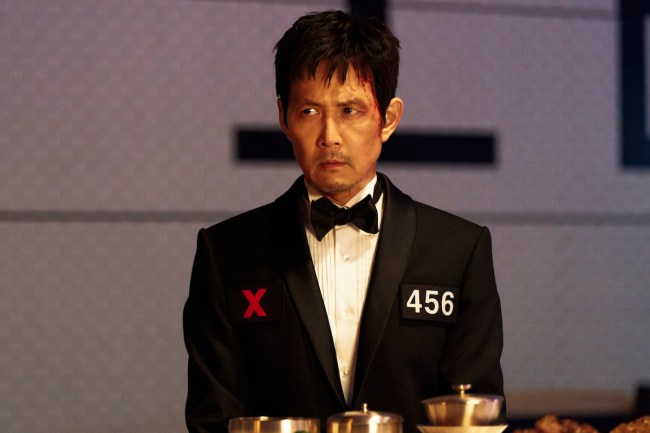The final season of “Squid Game” is both exactly what fans should expect and not quite what they’re being told. Speaking to the latter point first, Season 3 of Netflix‘s global hit drama series isn’t actually a third complete season of “Squid Game“; it’s the second half of the second season, which is, in and of itself, so heavily reminiscent of the first season that I’m hesitant to consider it a continuation as much as a reimagining.
Just like the original episodes, Seong Gi-hun (Lee Jung-jae) finds his way into the Squid Games. Just like before, Hwang Jun-ho (Wi Ha-joon) is leading an investigation into where the games are being held, who’s running them, and why. The bulk of the action, once again, is dedicated to the games themselves, as well as the players’ various motivations and interpersonal dynamics, creating a fitting allegory for capitalism: You devote your life to the pursuit of money — money that you desperately need, sure, but money that’s dangled out of reach by powerful assholes who would rather laugh at your desperation than help you survive.
Granted, Season 2 introduced a few clever alterations to keep the chaos fresh: Gi-hun had played these games before, so he knew how to help his fellow players (or so he thought, anyway). Hwang In-ho (Lee Byung-hun), aka the Front Man, joined the games himself, posing as another desperate stranger in order to better assess Gi-hun’s righteous crusade. Then there were new characters and new games, a new voting procedure and a new uprising, all while the plot dutifully crept forward.
But these minor tweaks and natural developments weren’t enough to recapture the novelty that made “Squid Game” so initially fascinating. Instead, creator Hwang Dong-hyuk relied on a two-pronged formula for satisfying his massive audience: giving them what they want (mainly, more savage gameplay indicative of a savage world) and trusting they’ve absorbed enough of the first season’s message about wealth inequality to appreciate how bluntly he went about balancing his own scales. (A “one for them, one for me” approach I have no choice but to respect.)
So here we are. Season 3. The final season. No matter what you call it, “Squid Game’s” ending still needs to pan out, and although the ultimate conclusion becomes evident pretty quickly (if it isn’t already), seeing Hwang stick to his message keeps the increasingly brutal new episodes from skewing into cruelty. While the general vibes are dour (there’s very little room left for humor), “Squid Game” delivers enough closure to satiate anyone still perched on the edge of their seat, and its brief, fleeting bursts of light frame the darkness with the starkest truths.

Without getting into spoilers, I’ll do my best to briefly unpack that analogy. Picking up right after the Season 2 finale’s failed coup, Season 3 finds Gi-hun in dire straits. He barely speaks, refuses to eat, and even abstains from the next vote — not because he knows it’s doomed, after so many red circles were killed trying to overthrow the Front Man, but because he’s simply too despondent to get off his ass.
Gi-hun’s ensuing arc is simple and relatable. After suffering an immense, unexpected setback — watching his dream of a better world die along with dozens of his fellow believers — Gi-hun has to find the will to continue, if he hopes to survive. But more perilous is his loss of faith in his fellow man. Amid the physical fights during each game, the broader battle between Gi-hun and the Front Man has always been existential: Are people worth saving? Are they inherently good, and only behave badly because of capitalism’s crushing maw? Or are they inherently bad, and all they need is an excuse to toss their friend under the proverbial bus or push an enemy off a literal cliff?
“Squid Game” has contorted the question through various relationships and situations, but the looming presence of another fatal game not only tests the trust established (or thought to be established) between players, it also distills their decisions down to a basic immediacy: At the start of one new game, Gi-hun sets his sights on a despicable target. But as he prowls around, looking to inflict his frustrations on a deserving stooge, his natural abhorrence for the primal behavior evoked by the games comes head-to-head with the do-or-die circumstances of the game he has to play. “Kill or be killed” isn’t a mentality he can decide against; it’s a reality he has to face, again and again.
Seeing that expansion and contraction over and over for six episodes (let alone three seasons) can grow tiring, and Season 3 certainly suffers from a sense of exhaustion. The gameplay can only do so much, and the futile story arcs of the island do even less. (Jun-ho and his search party are deliberately never given anything substantial to accomplish.) New games don’t provide the same impressive production design as we saw in Season 2, especially an overly simplified (and digitized) final game. Most characters end up exactly where you expect, but at least the performances remain strong and moving, and a few flourishes in the epilogue have a lasting impact.
It’s Hwang’s unflinching vision that carries “Squid Game” over the finish line. While it would be easy to argue you could see everything he sees after the first season, with little room for added depth thereafter, his steadfast conviction makes the heartache he expresses for each eliminated player last that much longer. Even if there’s no definitive answer to whether people, as a species, are good or bad, there’s also no disputing they deserve better than the Squid Games this world runs on.
Grade: B-
“Squid Game” Season 3 premieres Friday, June 27 on Netflix. All six episodes will be released at once.


